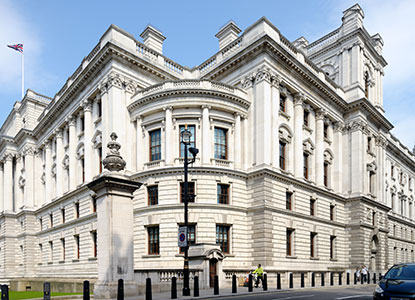
The Treasury. Photo: Shutterstock
In a report examining the £400bn of financial assets recorded on the 2014-15 Whole of Government Accounts, auditors concluded that, across these sectors, the assets presented a significant management challenge for Whitehall.
As the value of assets is closely related to economic performance, this increases the risks to public finances, while the concentration of assets can affect the government’s ability to sell assets quickly or achieve market price, according to the review.
The introduction of UK Government Investments – which has brought together the Shareholder Executive and UK Financial Investments – should help to consolidate and professionalise the government’s management approach, the NAO said.
Auditors concluded that, as the government increasingly looks to sell assets such as shares in the bailed out Lloyds Banking Group and Royal Bank of Scotland and possibly the student loan book, it needs sufficient understanding of their economic value in order to decide whether, when and how best to sell. To do this, ministers’ strategy for managing its portfolio of assets and the value achieved from any sales should be visible to Parliament and the public.
Auditor general Amyas Morse said that the government balance sheet provides an essential insight into how actions taken today might affect the public finances for generations to come.
“It highlights the most significant, strategic issues and financial risks that the government is facing now and in the future,” he said of the report.
“In light of recent events, the government’s management of its portfolio of significant liabilities and assets will be even more important and the government will need to keep in view the short and long-term outcomes for the taxpayer.”





















